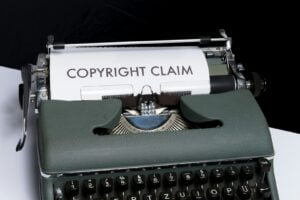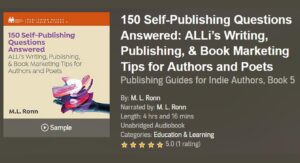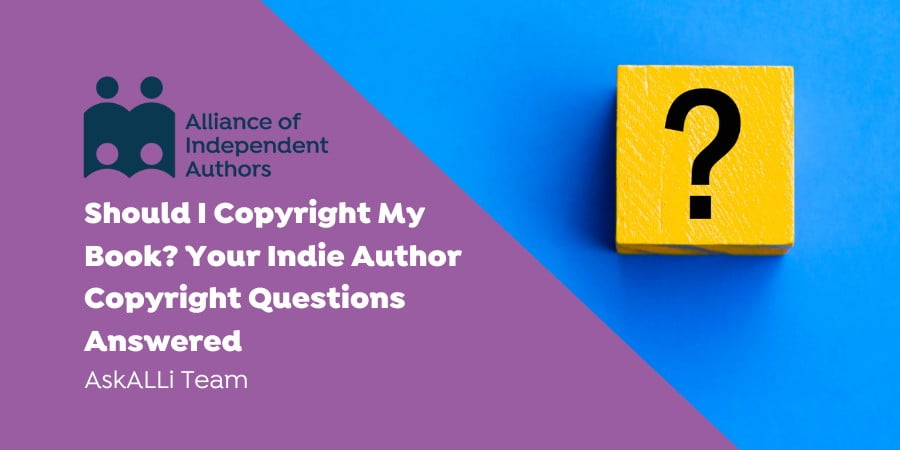
Photo by Markus Winkler on Unsplash
In this Alliance of Independent Authors post we'll explore some common indie author copyright questions. From whether copyrighting your work is necessary, to whether using a trademarked name in your book is possible.
If these FAQs get you thinking, you’ll find more information about ALLi’s book 150 Self-Publishing Questions Answered at the end of this post. It’s well worth a read to find the answers to all your burning indie author questions in one place.
Before we get started, what is copyright and why is it important that indie authors understand the rules?
Copyright is one of the main types of intellectual property. It allows the copyright owner to protect against others copying or reproducing their work, and affords an author the exclusive legal right to publish, perform, or record a literary work, to profit from it, and to authorize others to do the same.
Copyright law, policy, and practice underwrite the publication and sale of books. The income that every author and publisher receives derives from copyright law.
It’s worth knowing however, that there is no international copyright law. It varies by country and is enforced more in some countries than others.
Keeping up to date with the legislation in your territory is important for understanding your rights. For example, in the United States and Europe, copyright law entitles the author to commissions and royalties for their lifetime plus 70 years.
Six copyright questions every indie author should know the answer to
Should I copyright my book?

Photo by Thought Catalog on Unsplash
The short answer is no. Your work is copyrighted the moment you affix it to the page; digital, print or otherwise. You don’t have to take any additional action to copyright your work. You’re covered.
However a minority of countries, most significantly the United States, do ask that authors register their copyrights with the government. If your country offers this option, ALLi recommends you take it, even though there is usually a small fee associated with it.
In the United States, registering your work protects you if you need to file a lawsuit for copyright infringement, and it gives you access to more monetary damages.
More information on the copyright advice for US authors can be found in this ALLi post from the archives: Copyright for Authors
I've discovered my work-in-progress book is already out there. Should I quit writing?
As gut-wrenching as it may feel to find a similar book to one you are working on has been released, it’s OK, you can carry on.
Copyright is in the expression of the work, and your own expression will be unique to you. Readers won’t care that somebody else has written about your topic already. In fact, it’s quite the opposite. Think about the readers who love the other similar book. They probably want to read more books like it, which means you are a hero because your book meets their needs.
Once your book is out, you might even want to reach out to the other author and see if you can collaborate on a promotion. This can be a win-win situation.
Can I use a song lyric, quote, or another person’s work in my book?
The simple answer here is, no. Unless you have the content creator’s permission you can’t quote other people’s work, even song lyrics, in your own book. Unless you have explicit permission.
Songs are copyrighted themselves, and it is expensive to get permission from a record label to use famous song lyrics. Quotes are also copyrighted.
If you really want to include the quote, the general rule of thumb is to ask permission beforehand. This goes for using another person’s content of any type. Don't take the risk.
When do I need to attribute copyright ownership to a creator in my book?
Let’s say you want to use an image on your blog. First off, get permission from the image creator. You cannot simply download the image and start using it—it’s copyrighted.
Many works have a Creative Commons license that governs how you can use the work, which is helpful. You can use a site like Creative Commons Search to find images to use which are covered by this sort of license.
Be sure to follow the Creative Commons license rules though—for example, if the license requires attribution to the creator, be sure to give attribution.
When in doubt, always give the creator a shout out! If you prefer to avoid Creative Commons, you can purchase royalty-free images (also known as stock images) from sites like Shutterstock or Unsplash. Many of these sites offer plans where you can buy a la carte or download a certain number of images per month. Some also have a free option with a limited number of images available.
There are also websites for royalty-free stock videos, audio, and other types of content. However these may be of lower quality or you may find they have been used by others regularly.
Can I use trademarked company names or products in my book?

Photo by Ugur Akdemir on Unsplash
A trademark identifies and distinguishes a company or product in the marketplace. A classic example is the Coca-Cola logo and its slogan “Share a Coke.”
If you see those on a can of soda, you know you’re looking at a Coca-Cola product. If you manufacture soda, and you create a similar logo or slogan that makes customers think you are Coca-Cola, that’s trademark infringement because Coca-Cola will likely be harmed by losing customers.
Generally speaking, companies like to protect their names and products. They typically like to approve any mention of their brands, even in books. This is because they want to control their brands and anything associated with them.
We recommend avoiding using any trademark in your book’s title or subtitle. That is direct trademark infringement because it could confuse customers into thinking that your book is affiliated with the trademark.
For example, if you write interactive novels, you can’t call them Choose Your Own Adventures because that term is trademarked. Similarly, we’d recommend you avoid using trademarked company names or products in your book’s keywords to avoid any allegations of trademark infringement.
Using trademarks in your book’s manuscript is a different story. Sometimes, using brand names in the text of your manuscript is unavoidable. This is particularly true with nonfiction. For example, it would be almost impossible to write a book about car repairs without mentioning car brands. You can’t write a corporate history of Google without referencing its products. That kind of reference is OK.
In fiction, it’s generally safest to avoid using trademarks in your book’s text whenever possible. Instead of Coke, say cola. Instead of Levi’s, say jeans. It makes for better writing. Using brand names can detract from the story, and can also date your work. Companies go out of business, product lines go out of style, and the names you mention in your book today might be unrecognizable to future readers, which makes for a poorer reading experience.
What are ‘publishing rights’ for indie authors?
The right to produce or reproduce a book in any format—as a reprint, or a movie, or in translation—is a publishing right.
Publishing rights are typically granted by an author to a rights buyer such as a TV or film producer (or publisher) in the form of a license that grants permission for a specific use.
As ALLi’s legal advisor Helen Sedwick puts it:
Imagine that your book is a shopping center, and you are the landlord. Each empty shop represents a set of rights. One shop might be print books in English, another might be audiobooks in Spanish, another might be e-books in Mandarin, another might be movie rights, another TV rights, another audio drama, and so on. If your book becomes mega successful, your shopping center might even, like Harry Potter, include a theme park. Since your rent depends entirely on how much each shop sells, you want to rent to companies that have the wherewithal to use those particular rights to make money for you both.
In other words, you shouldn’t grant rights to the French translation of your book to an English-only publisher that is unlikely to exploit them. “Exploit” is the term you want to understand. Smart authors and publishers exploit opportunities to license their copyrights.
As you learn about, and begin to exploit, your publishing rights, keep the landlord analogy in mind. “Use it or lose it” is the proper attitude for authors to have toward rights buyers (including publishers).
Remember, in any negotiation, you as the author will want to limit the term, territory, and formats that you are offering to the buyer. This ensures you remain in as much control as possible of your own content.
Find out more:
 This post is based on just one of the chapters of the Alliance of Independent Author's book 150 Self-Publishing Questions Answered: ALLi’s Writing, Publishing, & Book Marketing Tips for Authors and Poets by M L Ronn.
This post is based on just one of the chapters of the Alliance of Independent Author's book 150 Self-Publishing Questions Answered: ALLi’s Writing, Publishing, & Book Marketing Tips for Authors and Poets by M L Ronn.
All the questions included in the book are based on real-world data & analytics, including: 1,000+ questions from our author members, 2000+ ALLi blog articles, 400+ ALLi podcast episodes, and questions submitted from ALLi member forums. Answers have been provided with input from world-class advisors from across the publishing industry.
Pick up the full book to find answers across all areas of indie publishing, including:
- Selling more books effortlessly
- Designing bestselling covers
- Winning the war against writer’s block
- Editing your book till it shines
150 Self-Publishing Questions Answered is available in the ALLi Bookstore. Members can enjoy the ebook for free.
Thoughts or further questions on this post or any self-publishing issue?
If you’re an ALLi member, head over to the SelfPubConnect forum for support from our experienced community of indie authors, advisors, and team. Simply create an account (if you haven’t already) to request to join the forum and get going.
Non-members looking for more information can search our extensive archive of blog posts and podcast episodes packed with tips and advice at ALLi's Self-Publishing Advice Center.
And if you haven’t already, we invite you to join our organization and become a self-publishing ally.





